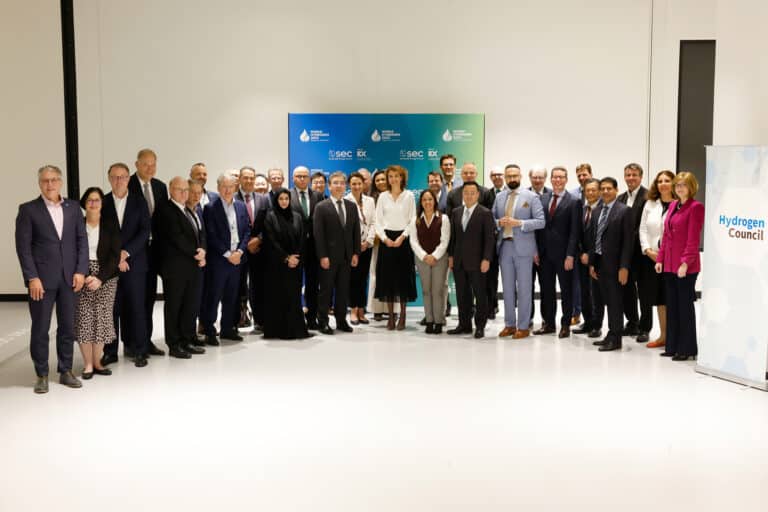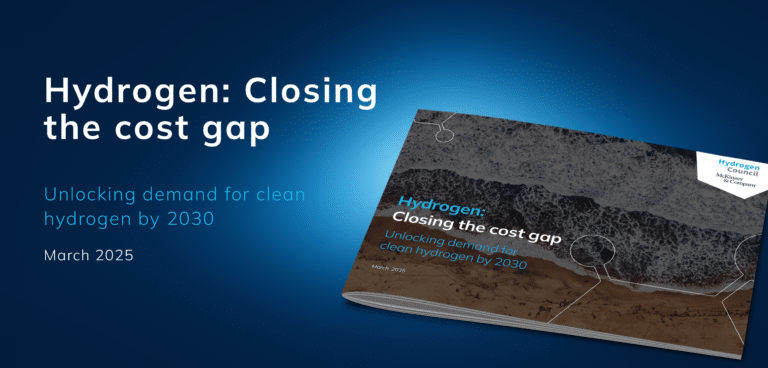Sasol joined the Hydrogen Council in 2021. Why was it important for you to become a member?
Sasol is a global leader in synthetic fuels and chemicals through our proprietary Fischer-Tropsch (FT) technology, using grey hydrogen as a key input together with carbon.
That makes us one the largest producers of grey hydrogen, producing approximately 2.4 million tons per year. We therefore have a vested interest to keep ourselves informed of the global hydrogen landscape and to participate in the shaping thereof. The Hydrogen Council is well placed in driving thought leadership, innovation and collaboration for role-players in hydrogen, and that made it important for us to be a part of it.
Climate change must be urgently addressed with decarbonisation a key global priority, which requires a collaborative effort involving stakeholders from all over the world. As the world transitions to more sustainable energy sources, green hydrogen has one of the most promising roles in decarbonising societies globally, while enabling modern societies to thrive sustainably. With Sasol’s feedstock agnostic FT technology, this positions us ideally to be a green hydrogen major and to lead the development of Southern Africa’s green hydrogen economy.
In a South African context, the energy transition and hydrogen economy offer exciting opportunities for a greener future. We believe one of the key roles Sasol can play is to leverage our international networks to assist in defining and delivering on South Africa’s vision.
We are eager to learn from our fellow members and equally, to share our experience in hydrogen, and participate in advancing the role of hydrogen in the global energy transition.
Tell us about the role for hydrogen in decarbonising both Sasol’s business and the economy of South Africa?
Green hydrogen is pivotal in our long-term strategy and essential to our net zero ambitions for our operations and for our customers. Operationally, green hydrogen will be a key enabler in transforming our South African value chain and position us as a leader in the country’s just energy transition.
Our proven FT processes, having served us well for more than 70 years, are fully compatible with green feedstocks and can produce sustainable products. We can use green hydrogen as feedstock, together with a sustainable carbon source, from direct air capture, or biogenic sources, to produce sustainable products, such as sustainable aviation fuels (SAF), other fuels and chemicals.
This production process will decarbonise our operations, while meeting the need for markets where decarbonisation is a key objective of governments and customers alike.
As a significant role-player in South Africa’s energy and industrial landscape, we can play a leading role in the country’s just energy transition, while exploring new opportunities to reindustrialise the economy through green hydrogen. We are actively exploring opportunities to export green hydrogen and ammonia, play a role in enabling green steel production and mobility for haulage. Together with South Africa’s abundant renewable energy potential, the country has significant potential to be a global green hydrogen hub.
What are Sasol’s top three hydrogen-related goals and ambitions for 2023?
Firstly, Sasol expects to produce the first pilot batch of green hydrogen at our Sasolburg Operations by the end of 2023. We have signed approximately 550MW in renewable energy projects, one of which is 69MW that will provide the energy to this electrolyser. These two developments are critical in our journey towards reducing our greenhouse gas emissions and reach our reduction of 30% by 2030.
Secondly, we are progressing an opportunity, known as the HyShiFT project, to produce sustainable aviation fuels in Secunda in partnership with Linde, Enertrag and Hydregen. The HyShiFT project aims to invest in about 500MW of renewable energy that will supply a 200MW electrolyser for green hydrogen production. The produced green hydrogen will be processed with an eligible carbon dioxide source in Sasol’s existing FT facility in Secunda to produce approximately 45,000 tons a year of eSAF product.
Lastly, we are progressing various studies in support of establishing a green hydrogen economy in South Africa. These include Boegoebaai pre-feasibility, as well as work with ArcelorMittal South Africa to advance two projects to develop a green hydrogen production hub at Saldanha Bay and the Vaal carbon capture and utilisation (CCU) project. The pre-feasibility study into Boegoebaai in the Northern Cape province as a green hydrogen and ammonia export hub has progressed well. We shared information on this study at the Hydrogen Council meeting in Washington in 2022. We will thoroughly assess the results of the study once complete, to establish how we progress this opportunity.
As momentum for hydrogen continues to increase, where do you think the Hydrogen Council needs to focus its efforts in 2023?
Permitting linked to policy and legislation was identified as the challenge of the day at the Regional CEO meeting in Houston. Efforts should, in my view, be focused on development of clear and succinct messaging and materials on key issues, which CEO members can use to contribute to policy and regulatory shaping in their countries of business and for advocacy on hydrogen-related topics. Clear, workable and stable standards will assist greatly with the activation of the hydrogen ecosystem and should remain a focus area as it remains key to activating cross-border trading.
About The Hydrogen Council
The Hydrogen Council is a global CEO-led initiative that brings together leading companies with a united vision and long-term ambition for hydrogen to foster the clean energy transition. The Council believes that hydrogen has a key role to play in reaching our global decarbonization goals by helping to diversify energy sources worldwide, foster business and technological innovation as drivers for long-term economic growth, and decarbonize hard-to-abate sectors.
Using its global reach to promote collaboration between governments, industry and investors, the Council provides guidance on accelerating the deployment of hydrogen solutions around the world. It also acts as a business marketplace, bringing together a diverse group of 140+ companies based in 20+ countries across the entire hydrogen value chain, including large multinationals, innovative SMEs, and investors.
The Hydrogen Council also serves as a resource for safety standards and an interlocutor for the investment community, while identifying opportunities for regulatory advocacy in key geographies.
To find out more visit www.hydrogencouncil.com and follow us on Twitter @HydrogenCouncil and LinkedIn.
Joanna Sampson, Communications Manager, Hydrogen Council
joanna.sampson@hydrogencouncouncil.com



